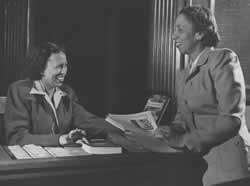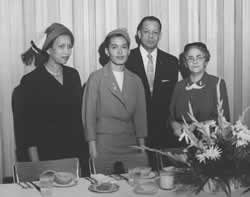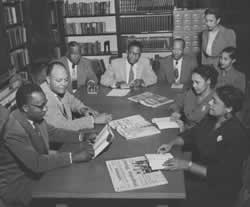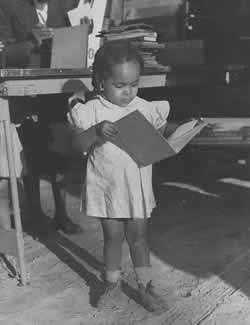1940 - 1965

Head librarian Ray Moore, seated, talks with former head librarian Selena Warren Wheeler.

(l-r) Head librarian Ray Moore, visiting author and activist Pauli Murray, banker and civil rights activist John Wheeler, founder of Negro Braille Magazine Lyda Merrick

American Heritage Series discussion group
The first 25 years at the new Stanford L. Warren Public Library were filled with activity and change. Selena Warren Wheeler (daughter of Dr. Warren) had assumed the role of head librarian after Hattie B. Wooten’s death. Wheeler, with the benefit of a comfortable new space, was able to build upon the foundation that Wooten had established to keep growing the library into a vibrant community center. Wheeler retired in 1945 and was replaced by Ray N. Moore, who maintained the position of head librarian until 1966.
The 1940s and 1950s saw the introduction of many activities for adults and children, including the Saturday Morning Movie Hour, the Story Telling Institute, Book Review Forums and the American Heritage Series. Book Review Forums were monthly meetings where attendees gathered to listen to a speaker—usually an African-American educator, civic leader or writer—review a book or discuss an issue. The Book Review Forums attracted many prominent speakers such as authors Pauli Murray and Peter Abrahams, and educators John Hope Franklin and Horace Mann Bond. The American Heritage Series, which lasted for three years beginning in 1953, was a series of periodic community meetings jointly sponsored by the American Library Association, the North Carolina Library Commission and local libraries. Each meeting centered on a theme of contemporary social life discussed within the context of traditional American values. Meetings were held on the themes of "The Role of the Family in Democratic Living," "The Freedom to Read," and "One Hundred Per Cent Americans," among others.
A significant piece of the library’s history is contained in what became known in 1942 as the Negro Collection. The original 799 volumes with which Dr. Aaron Moore began the Durham Colored Library contained a number of books by and about African Americans and African-American culture. Related titles were steadily added to the library’s collection over the years. In 1942 Selena Wheeler, recognizing the uniqueness and importance of many of the African-American materials owned by the library, designated the Negro Collection as a special, non-circulating collection. It was renamed the Selena Warren Wheeler Collection in her honor in 1990.

Patrons enjoying the Library Corner for the Blind
A unique development at the library and in the community came in 1949 thanks to Lyda Moore Merrick, chairwoman of the board of trustees and the daughter of library founder Dr. Aaron Moore, and her friend John Carter Washington. Washington had been blind since infancy, and Merrick spent much time at the library reading to blind patrons. The two started the Library Corner for the Blind to provide a center for information resources and recreational opportunities for blind Durham residents. The Corner was a huge success, and in 1951 Merrick and Washington founded the Negro Braille Magazine, a publication that printed Braille versions of news and feature stories of interest to African Americans. The magazine was renamed Merrick-Washington Magazine for the Blind in 1981 and is still in operation today.

A young bookmobile patron makes her selection.
Throughout the 1940s and into the 1960s, the Stanford L. Warren Library strove to expand service to all African-American residents of Durham County, not just those with easy access to the library building. The library began operating its first bookmobile in 1941. Previously, distance services had been provided through book deposit stations throughout Durham County. These were less than ideal. Most were operated through schools, so they were open only eight months out of the year and did not provide services for adults. Paid for through funds from the North Carolina State Library Commission and other state agencies, the bookmobile was a tremendous success. Every other week, it went to locations throughout the county, traveling nearly 600 miles per month. Rural residents deeply appreciated their new access to library services. As a result of the newly-expanded service, Annie Tucker and Gladys Whitted were hired as permanent staff. The library bought a new, bigger bookmobile in 1948.
Once again the library was outgrowing its facilities. In 1949 the board of trustees decided to borrow $20,000 from North Carolina Mutual Life Insurance Company to build an addition onto the library. The addition, completed in 1951, provided the library with a new children’s room, extra storage space, a room to house bookmobile supplies, and extra workspace.
Between 1954 and 1961 the Stanford L. Warren Library built three branches. The McDougald Terrace Community Library opened in 1954, the John Avery Boys Club branch opened in 1960 and the Bragtown branch opened in 1961. The McDougald Terrace Community Library, located in the McDougald Terrace housing project, provided reading material and activities to the nearly 250 families who lived there. The John Avery Boys Club branch was operated by the director of the Boys Club, Lee Smith. The McDougald Terrace and Bragtown branches are still in operation today.
In 1964 the library held a "50 Years of Service" celebration at White Rock Baptist Church, site of the original Durham Colored Library. The Stanford L. Warren Library had grown and developed impressively over those fifty years. The library remained a cultural hub for Durham’s African-American community, but the 1960s brought sweeping changes to the city’s landscape, and the library could not avoid being caught up in them.
